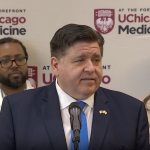
Here’s how Alverno Laboratories is helping to diagnose deadly Sepsis
Alverno Laboratories has implemented new technology that will allow medical personnel to diagnose Sepsis as much as 24 hours faster.
According to the Centers for Disease Control and Prevention, Sepsis, a life-threatening medical emergency, is “the body’s extreme response to an infection.” Sepsis occurs when an infection a patient already has – in their skin, lungs, urinary tract, or elsewhere – triggers a chain reaction throughout their body. “Without timely treatment, Sepsis can rapidly lead to tissue damage, organ failure and death,” according to the CDC, which stated one in three patients who die in a hospital have Sepsis. Further, the CDC noted that 1.7 million adults in America develop Sepsis each year, and nearly 270,000 Americans die as a result of Sepsis on a yearly basis.
Alverno is introducing an arsenal of solutions to quicken the process of diagnosing Sepsis, which includes blood culture improvements at Alverno’s central lab, located in Hammond, Indiana. Alverno works with hospitals within its network on Sepsis protocols, sometimes called “Sepsis Trackers”, that must be completed by hospital personnel within a certain number of hours.
“We work to combat this deadly disease by quicker organism ID at the central lab and working with hospitals on Sepsis protocols,” said Alverno’s CEO Sam Terese. “We have a vision of our customer experience and keep our finger on the pulse of progress and technology and testing that elevates patient care.” All Alverno hospital laboratories have testing capabilities to support the rapid detection of septic patients.
Typically, blood culture bottles are drawn at the hospital and begin incubation there. The bottles are then transported to Alverno’s central lab in special “coolers” that keep the incubation going during transport. Once at the central lab, blood culture bottles continue to incubate on a special incubator. If the instrument detects bacteria growing in a bottle, the incubator will alarm to notify the microbiologists. A sample is taken from the bottle and stained to determine if bacteria are present and is then put on special media to grow the organism. At the same time, “Sepsityping” centrifuges, washes and identifies what type of bacteria is present based on identification of proteins. This entire process from a positive alarm to knowing what kind of bacteria is present takes around two hours. Alverno also performs rapid identification of “super” bugs to help guide treatment while waiting on the antibiotic report. Certain organisms known to carry genes that make them harder to treat, such as Staph aureus, are tested to determine if that organism carries the gene or not.
In December, Alverno began rapid susceptibility testing which guides the physician on what antibiotic therapy will work and which will not be effective, Terese said. “This takes away the guess work of what antibiotic to give,” Terese stated. Using another concentration technique, bacteria direct from the positive blood culture bottle are tested against antibiotics. In the past, testing for antibiotics did not begin until the bacteria had grown overnight on the special media. The rapid susceptibility testing has reduced the time to reporting the effective antibiotics for treatment by 18 to 24 hours. In total, all these improvements in microbiology techniques have resulted in better patient care and may decrease deaths from Sepsis. The total time from detecting bacteria in a patient’s blood to telling the Doctor what antibiotic to use is now twice as fast as before.
In the last decade under Terese’s leadership, Alverno’s revenue has averaged 20 percent yearly growth. This year alone the company has made numerous major announcements, including:
- Becoming the first U.S.-based laboratory network to launch groundbreaking full scale digital pathology services from Royal Philips that will assess and diagnose diseases such as cancer from surgical pathology cases digitally, instead of using a microscope.
- The implementation of a state-of-the-art, High Sensitivity Cardiac Troponin Assay that enables heart attacks to be detected faster and more accurately. The test has the potential to move patients out of the emergency room faster with more sensitive testing and ruling out heart attacks quicker. In addition, patients presenting with a heart attack may be diagnosed quicker, allowing them to have treatment in a timelier fashion. There is also the potential for fewer false positive admissions.
- The implementation of Precision Medicine into its network. Precision medicine seeks to predict which treatment and prevention strategies for certain diseases will work in which groups of people. According to Terese, the company purchased a genome sequencer that can reveal genetic mutations that can offer clues about a patient’s diagnosis or how they will respond to treatment.
- Taking on the opioid crisis head on with the implementation of groundbreaking, Liquid Chromatography Mass Spectrometer (LCMS) drug testing technology. The state-of-the-art technology, which will be implemented by early 2020, will allow medical personnel to determine whether a patient is taking his or her medications as prescribed and assist the physician to provide better care and management of medications.
- Adding two key Chicago hospitals, along with several suburban AMITA Health hospitals, to its network. Alverno added Mount Sinai Hospital, 1500 S. Fairfield Ave., and Holy Cross Hospital, 2701 W. 68th, plus eight suburban AMITA hospitals. It increases the number of hospitals in Alverno’s network to 36, doubling the 18 Alverno partnered with in 2005.
- The additional hospitals will require Alverno to add 20 associates to the central lab and will increase the total number of associates from 1,700 to around 2,100, Terese said. He added that Alverno’s next goal is to expand to Wisconsin, Iowa and Michigan.






